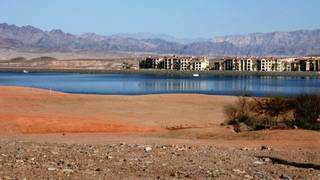Wednesday, May 26, 2010 | 10:03 a.m.
Sun archives
- Lake Las Vegas golf course owner sues Henderson over water agreement (5-14-2010)
- Henderson, Lake Las Vegas reach agreement on water issues (4-20-2010)
- Wide-open fairways at Lake Las Vegas (3-31-2010)
- Lake Las Vegas proposes bankruptcy plan (9-5-2009)
- Judge approves bankruptcy for Lake Las Vegas golf course (6-29-2009)
- Another golf course to close at struggling Lake Las Vegas (6-25-2009)
- Lake Las Vegas can abandon golf course, judge says (1-15-2009)
- Judge: Lake Las Vegas golf course should be shuttered (12-22-2008)
- Resort golf course’s fate spurs debate (12-16-2008)
New objections have been filed to the Lake Las Vegas bankruptcy reorganization plan, including one by the city of Henderson.
As the nearly 2-year-old bankruptcy case plods along, creditors' attorneys have been scrutinizing the reorganization plan in which:
-- International financial giant Credit Suisse Group AG would convert its $670 million claim to equity
-- The development's former owners would be sued so Credit Suisse and other creditors could recover some of their losses
-- Some funding would be set aside for continued infrastructure development at the resort community 20 miles southeast of the Las Vegas Strip.
In its objection filed this week in U.S. Bankruptcy Court in Las Vegas, attorneys for Henderson said the plan to finance continued infrastructure development is inadequate.
The city has millions of dollars at stake in the development, since it sold bonds to finance roads and other infrastructure at the project that includes a man-made lake, 1,700 homes and land for development of another 5,000 homes.
"While the city is desirous of an amicable confirmation of the plan, as currently drafted, the plan is not feasible and therefore, cannot be confirmed," the city's objection said.
The city's objection concerns a local improvement district called T-16 LID, which was created in 2005 for The Falls portion or Phase II of Lake Las Vegas. The city sold bonds to finance 86 projects in the district such as roads, parks and trails and water, sewer and drainage works.
The city has been levying assessments against property owners to cover the bond costs. The plan called for Lake Las Vegas to complete the infrastructure. The city would then reimburse Lake Las Vegas up to $33 million and assume control of the improvements.
The city specifically objected to provisions in the plan changing the scope of work in one project, changing "the scheme of construction and payment" and changing the contractor from the Lake Las Vegas entity that signed the infrastructure deal, LLV-1 LLC.
The city complained that the plan sets aside just $1.249 million to complete work described as the "X-West" segments, when the cost for those projects is more than twice that amount at $2.927 million.
"The city is of the view that it may not and should not amend the (infrastructure) acquisition agreement in a material way, without the consent of the bond owners since the bond owners' investment decision was based on the acquisition agreement," the city's filing said.
The city noted that all of the infrastructure spelled out in the bond and acquisition agreements is supposed to be completed, not just parts of the infrastructure.
"It is the combination and interconnectivity of the various infrastructure segments, not just a portion thereof, that creates the beneficial value for the property," the city filing said.
Additional objections to the reorganization plan were filed by two companies that had invested in Lake Las Vegas prior to the bankruptcy -- Transcontinental Corp. of Santa Barbara, Calif., and Fort Worth, Texas, company Carmel Land & Cattle Co.
Both of these companies, along with other investors, have been named as litigation targets by Lake Las Vegas. Attorneys for Lake Las Vegas have argued the former owners of Lake Las Vegas drained it of $470 million in equity with a 2004 financing deal -- leaving it short of cash and putting the development on the path toward bankruptcy.
But Transcontinental has charged the entire bankruptcy case is a sham since it says Credit Suisse is both the main debtor and creditor. It claims that after Credit Suisse provided a $670 million predatory loan to the property during the economic boom and encouraged the owners to withdraw much of their equity, Credit Suisse then effectively took over the development.
The other targets to be sued as former investors, according to the Lake Las Vegas bankruptcy reorganization plan, include Texas billionaire brothers Lee M. Bass, Robert Bass and Sid R. Bass; and fellow Texan Richard Rainwater, who formerly managed Bass family investments before becoming a billionaire in his own right. A spokeswoman for Robert Bass, however, has said he never invested in Lake Las Vegas.
Credit Suisse and Lake Las Vegas have denied the predatory lending allegations. Lake Las Vegas hasn't yet responded to the newest objections to its reorganization plan.
A June 21 hearing is set on whether the reorganization plan should be approved.


Join the Discussion:
Check this out for a full explanation of our conversion to the LiveFyre commenting system and instructions on how to sign up for an account.
Full comments policy